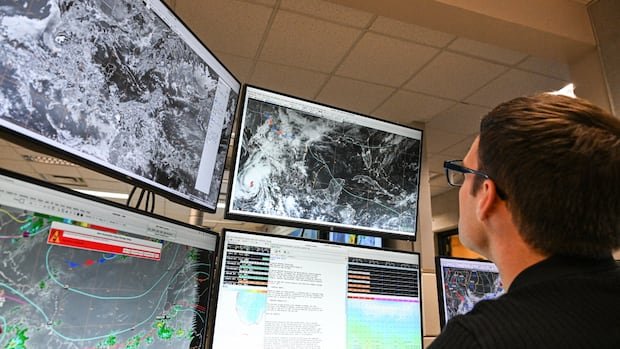The impact of post-tropical storm Fiona on Peggy Savery’s coastal home in Port aux Basques, N.L., was a stark reminder of the speed at which disasters can strike. Savery shared that she barely had 30 minutes to evacuate before the storm hit, resulting in the loss of her property to the sea. The 2022 storm not only devastated Atlantic Canada but also caused significant damage in some Caribbean islands.
Following the traumatic experience, Savery relocated farther from the ocean and remains vigilant when hurricanes or major storms are forecasted. She emphasized the importance of preparedness, cautioning against complacency in the face of natural disasters.
Experts are exploring the potential of artificial intelligence (AI) to enhance hurricane prediction capabilities, although further research and development are necessary. AI integration is already underway in global weather forecasting systems, such as the U.S. National Hurricane Center and the European Centre for Medium-Range Weather Forecasts.
Richard Turner, a member of the Cambridge University team behind Aardvark Weather, highlighted the advantages of AI-driven weather prediction systems. Unlike traditional methods that rely on vast amounts of current atmospheric data, AI models leverage historical weather patterns to make predictions with fewer resources.
While AI excels in tracking the path of hurricanes, its ability to forecast storm intensity, including wind speeds, remains a challenge. Turner acknowledged the ongoing work required to enhance AI’s predictive accuracy in this aspect.
Despite AI’s rapid development, Turner emphasized the complementary relationship between AI and traditional forecasting methods. He stressed the need for continued testing and evaluation to ensure the safety and reliability of AI-based forecasting systems.
However, the progress in AI development for hurricane forecasting faces potential setbacks due to budget cuts affecting climate organizations in the U.S. Turner expressed concern over the impact of reduced data availability from agencies like NOAA on training AI systems.
Environment and Climate Change Canada declined to comment on the implications of NOAA cuts on hurricane forecasting in Canada. Nonetheless, it assured Canadians of the continued provision of timely and reliable hurricane forecasts and tracking information.
Looking ahead, the potential of AI in forecasting offers hope for better preparedness and mitigation strategies for individuals like Peggy Savery, who are vulnerable to the destructive forces of natural disasters. Turner emphasized the urgent need for improved forecasting systems to enhance disaster response efforts.

